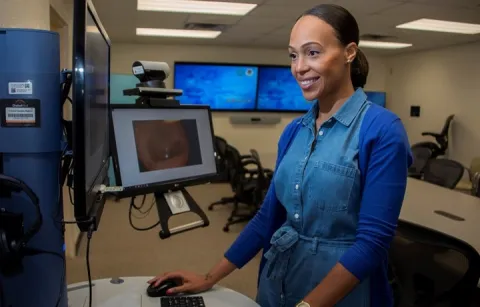Addressing the challenges to the cancer community raised by COVID-19
Three UICC virtual Members Dialogues held in May and June provided insights and recommendations for some of the major challenges facing the cancer community amidst the coronavirus pandemic.

The enforcement of social distancing guidelines and lockdown measures to contain the spread of COVID-19 has added to the challenges faced by organisations in the cancer community. These include a considerable drop in fundraising, the need to innovate and adapt to new ways of working and use new, digital tools to deliver services, the wide-ranging disruptions to cancer care that carry considerable long-term risks, the fears and misinformation surrounding cancer and COVID-19, the protection of healthcare workers and a move towards greater collaboration between stakeholders in healthcare and between countries.
The disruptions to cancer services were highlighted in a preliminary report by WHO early June on health service delivery for Non-Communicable Diseases amidst the coronavirus pandemic.
The purpose of the UICC Member Dialogues was to identify these challenges experienced by members around the world, though often in specific settings that made one or the other easier or harder to manage. The primary ambition was to facilitate peer learning and connections, and to rekindle a sense of community at a time when most participants were isolated, to some extent, during the pandemic.
The Dialogues brought together 78 participants representing 70 different UICC member organisations from 41 countries. The discussions took place in breakout rooms with key points discussed in the plenary sessions, and were hosted in English with language support for French- and Spanish-speaking participants.
The shared experiences and insights provided a number of solutions and recommendations for others to pursue, and these are shared below at the end of the article.
Fundraising and economic impact
Fundraising events have been suspended due to social distancing measures, while the pandemic has led to the redirection of funds from cancer to COVID-19 responses. Members have also observed significant reductions in investments in healthcare due to economic impact of the pandemic.
Some organisations were able to mobilise their supporters around COVID-19 as a general public health crisis and meet their targets, while others benefited from a strong national culture of collective giving. For the most part, however, organisations have been required to rethink their activities and explore innovative approaches, such as digital fundraising. An example is the adaptation of fundraiser walks into e-walks by Cancer Research UK.
Innovation and adaptation
As with many organisations, those in the cancer community were forced to adapt rapidly and innovate in order to continue providing support and delivering essential services to their stakeholders. The most significant shift was towards digital solutions, such as e-prescriptions and telemedicine consultations, and the use of social media and webinar platforms for group meetings, counselling, and other support programmes such as yoga classes and pet therapy.
Undoubtedly many of these services will continue well after the pandemic subsides. They have proved to be convenient and effective in reducing the amount of travel and time spent in hospitalised settings. However, digital services cannot adequately replace face-to-face human interactions, such as giving a patient a hug during a support session, and there is a risk of increasing the inequalities in healthcare, especially in LMICs, as access to digital tools is lacking in many areas.
"Remote support groups have been successful online, some will be continued forever; however, they do not replace human touch."
- Alejandra de Cima, President of Fundación CIMA, Mexico
Fear and misinformation
Cancer patients are afraid to come to hospitals due to a fear of contracting the virus or because of strict lockdown measures that prevented them from travelling. This, in turn, has generated legitimate fears about more serious outcomes due to delayed treatments and patients consulting at more advanced stages of cancer.
Adding to these fears was the amount of misinformation on COVID-19 that has been circulating, or too much information that overwhelmed patients. Many are already in vulnerable situations, often isolated, requiring additional efforts to support them. Participants also cited insufficient guidance from governments for health and social services, and several organisations worked closely with authorities to issue reliable guidelines for cancer patients.
Disruption and delay of cancer services
Cancer services have been disrupted across the board, not only in terms of delayed treatments. There has been a significant reduction in cancer screenings and diagnoses and other preventive measures, again raising concerns about long-term drops in completion rates and increases in mortality and morbidity rates.
The disruptions were due to a number of causes, including the diversion of resources and funds to respond to the pandemic, the fear of contagion, the distances required to travel to health centres or the inability to do so when transportation services were cancelled, as well as interruptions in the supply chains for essential medicines and protective equipment (PPE).
Our advocacy as cancer leaders should also be not just on the continuity of existing services but also how to enable new patients to access care when COVID-19 not cancer is the priority.
Poonam Bagui, Chairman and Acting CEO at Cankids...KidsCan, India
Protection of health care workers
Indeed, many health centres raised the issue of the lack of access to PPE, as well as increased rates of mental health issues and burnout. It was also mentioned that healthcare workers faced stigma in their communities due to the pandemic, as they were in or near settings where COVID-19 was being treated.
This highlighted the importance of strengthening the civil society workforce; they also deliver services to oncology patients during the pandemic and can be in need of psychosocial support.
More generally, the problem emphasised the difficult choices required in balancing the health and safety of patients with those of the caregivers.
Takeaways from the sessions
An effective response to the crisis means ensuring that services continue with minimal disruptions to limit the long-term risks. This requires greater solidarity and collaboration among the different stakeholders in the healthcare sector – public authorities, the private sector, civil society and the pharmaceutical industry. Parties must develop a measure of trust by building connections and working together to provide a strong, unified voice and message for cancer control.
As we move to the digitalisation of services, we need to also think of how to reach those that are not able to connect digitally.
- Carmen Auste, CEO of Cancer Warriors Foundation, Philippines
Participants raised the following actions as possible responses that organisations can take to address the major challenges facing cancer care during the pandemic:
- Engage younger generations for fundraising efforts as they are more familiar with digital platforms, and implement strong risk management processes to help navigate funding challenges.
- Develop disaster preparedness policies and set up contingency plans in case a new crisis occurs.
- Empower and encourage staff to come up with solutions, for example setting up an ideas bank or virtual ways to collaborate, and ensuring that leadership meets more regularly to sign off new projects quicker.
- Provide education and emotional support to cancer patients, caregivers and families, to reduce the fear and anxiety many are experiencing; ensure that psychosocial services are well integrated into public health systems.
- Have clear strategies for health communication to dispel myths and misconceptions regarding the disease (COVID-19) and the particular vulnerability of cancer patients.
- Be prepared to address the potential backlog of delayed diagnosis and treatment services for those delayed due to lockdown.
- Allow longer-term prescriptions for medications to ensure patients do not run out of medicine during the lockdown.
UICC welcomes that the pandemic has at least led to a renewed focus on health services. Cancer, as one of the leading causes of death worldwide, must remain a top priority in health care. There is an overall need to strengthen community services and health systems, and close the inequality gap so that these systems work equally for everyone. As many countries emerge from the initial lockdown, it is time to start shifting the message of the cancer community from one of protection from COVID-19 to resuming cancer services.
Last update
Thursday 06 May 2021
